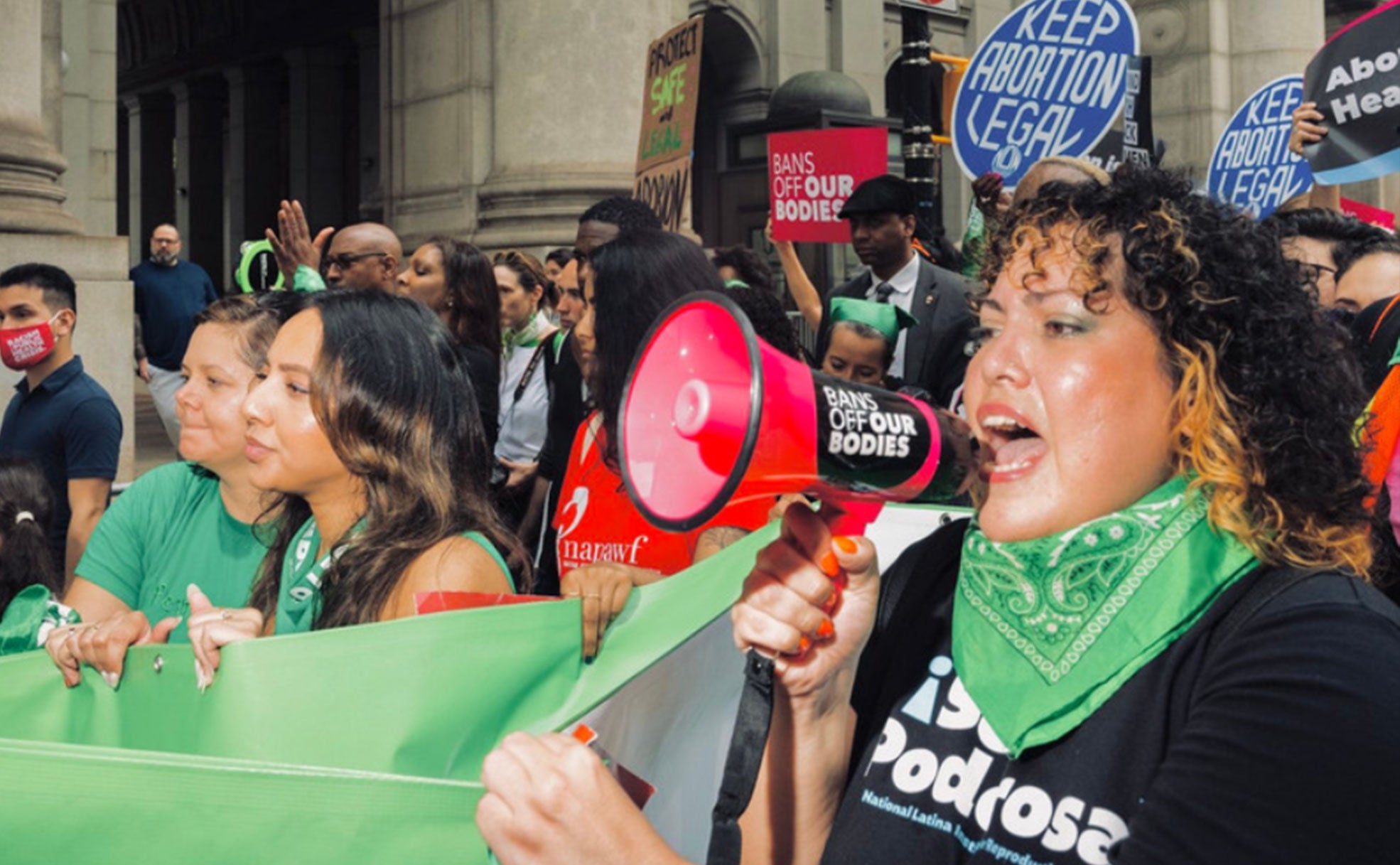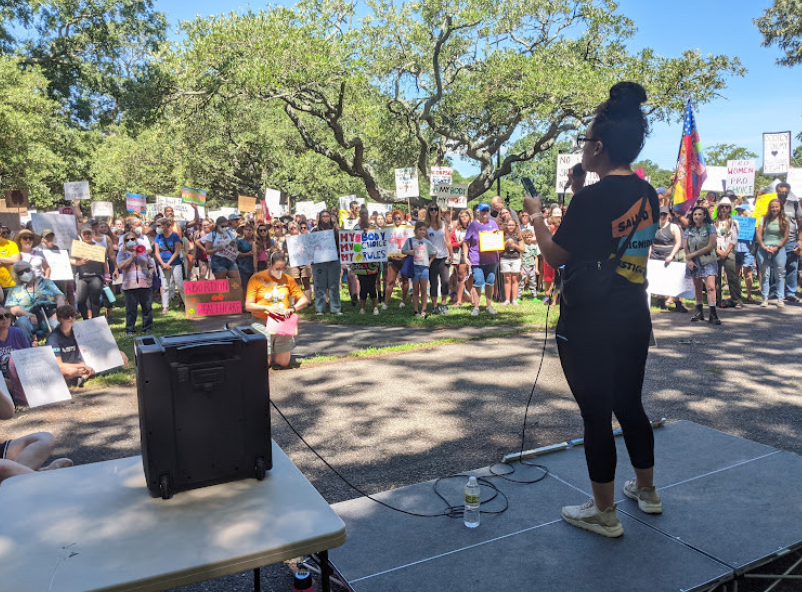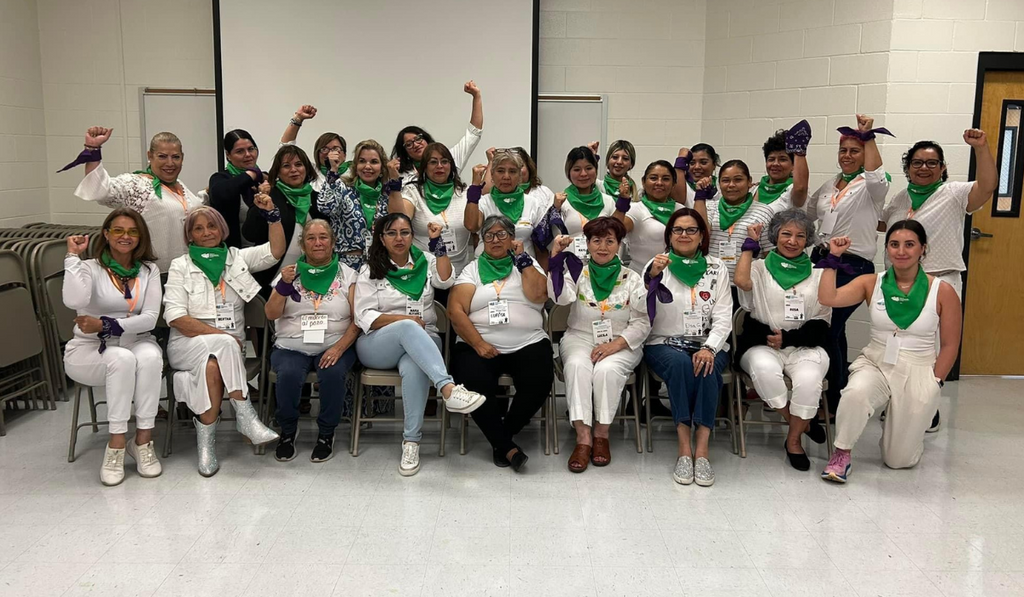
Latina/x Activists Fighting for Their Bodies and Their Lives
On June 24, 2022, following a Supreme Court decision in Dobbs v. Jackson Women's Health Organization, the US Supreme Court overturned Roe v. Wade. This put an end to the landmark piece of legislation that made access to an abortion a federal right in the United States. Several states since then have enacted extremely restrictive abortion bans, and most making no exceptions for rape or incest.
Since the Dobbs decision, the National Partnership for Women and Families reported that as of 2023, nearly 6.7 million Latinas live in the 26 states that have banned or are likely to ban abortion. They represent the largest group of women of color impacted by current or likely state bans. And more than 3 million Latinas living in these states are economically insecure. Women with low incomes are especially impacted by state bans as they are more likely to lack access to the necessary funds to travel to another state for abortion care and, as a result, become significantly more likely to be pushed deeper into poverty.
The National Latina Institute for Reproductive Justice (Latina Institute) is a nonprofit that fights for equal access to reproductive health for Latina/x communities because all of us should have the power to make informed decisions about our bodies, families, and futures. They build Latina/x activist bases in Texas, Florida, Virginia, and New York to carry out their mission and have supporters nationally. The organization advocates for policies that improve the reproductive health and well being of their community. Their activists share insights from their communities on the ground with state and national teams to shape policy agendas along with sharing their own stories and developing awareness campaigns to help people in power understand reproductive justice.
We are thrilled to make Latina Institute our cause partner this quarter and this Women's History Month. A portion of each sale made on our website will be donated to the organization for this duration. Read our interview below with Gabriella Watson, a State Policy Advocate of the Latina Institute who works on the Virginia team. Watson works to build relationships with legislators within the Virginia General Assembly and with community partners to advance proactive policies that are community informed and rooted in reproductive justice.

How was the Latina Institute founded and by whom?
So the National Latina Institute for Reproductive Justice was founded in 1994 by Latina activists and it was founded with the purpose to address the unique challenges of reproductive health and rights specifically for Latina/x individuals. And this year in 2024 is actually our 30th anniversary, which is really exciting. So a little bit about our work here at the organization - we are the only national reproductive justice organization that is dedicated solely to Latina/x communities in the U.S. So we feel like we have the unique responsibility to center and amplify the voices of those who are most impacted by social and reproductive injustices.
We have teams across the country. I'm in Virginia, and we have teams in New York, Florida and Texas. And together, we work to build our activist base to shake policies that address the challenges that are unique to Latina/x and immigrant communities and then to shift culture to fuel this larger reproductive justice movement and the most important part of our work are activists. They're known as the poderosas. They are the cornerstone of our base building efforts, and essentially we support them in stepping into their power to make informed decisions about their bodies their families and their futures
How does the intersectionality of the Latina/x community affect their access to reproductive health care and health care in general?
The heart of our mission really lies in understanding and dismantling the barriers that Latina/x individuals face in accessing reproductive health care. But for us it's not just about health. It's about race, gender, money, and immigration status as well. So we're working towards creating a health care system that truly serves everyone. One that takes into consideration all of these factors and promotes equity for the Latina/x community. And everyone of our states has a different portfolio of work. But here in Virginia this legislative session, my team has worked really hard to advocate for several proactive policies including a Contraceptive Equity Act that I wanted to just highlight briefly.
At Latina Institute, Virginia, we believe that access to contraception is a basic right and an essential part of sexual reproductive health care, but our communities disproportionately face barriers due to factors like documentation, language, transportation, time, and cost. So for this reason the Contraceptive Equity Act has been such a priority for us this session because passing it would mean people across the state including Latinas and other communities of color would be able to access and afford the care that they really need.
What are the biggest misconceptions/misrepresentations about the Latina/x community that have negatively impacted their reproductive rights?
So misconceptions about and I think even within the Latina/x community, they deeply affect our reproductive health and rights and they perpetuate disparities. So as we've seen since the Supreme Court's Dobbs decision access to abortion care, it's gone from bad to worse and this is particularly true for Latina/x and immigrant communities. So many people are confused about what the laws are in their own state or where they can go for information or health care and this is made it so much easier for misinformation to spread. And then you combine this with fears about documentation, financial and language barriers, and together all this works to prevent so many people from seeking the care that they need. I will say though that while it's disheartening to see this climate of fear and uncertainty, we do know that the majority of people in the US, including Latinos, they support access to abortion care and they don't want extreme politicians interfering with their personal health care decisions.

Tell us more about the Poderosa Mountain program and who can be a part of it. What does it mean to you to be poderosa to you?
So for me, this work, it's deeply personal. My grandmother, she was an immigrant from Chile and a nurse and she provided abortion care in New York in the 60s and the 70s. I consider myself so lucky to have grown up with her and surrounded by women who were really open about the realities of our health care system. And they taught me from a young age the principles of reproductive justice and bodily autonomy.
And this is something I've seen in, and I really admire about our Poderosa program, is that this movement building work - it's multi-generational. It educates and develops leaders and it means joining this supportive and empowering space that really centers storytelling. I've been here five months, but it's been so impactful to see this firsthand and a privilege to be trusted with our Poderosa stories and their experiences. So to me being Poderosa, it means embodying strength, resilience, and empowerment. But it's not just about our individual power. It's the collective force we create when we share our stories and support one another.
What does it mean to be a child of immigrants?
I was sharing, the other day, my story about my grandma. I was talking with her about her experience providing health care in New York as an immigrant for almost two decades. And someone commented that “immigrants make the world go round” and I really felt like that was so true. And it's seeing that strength that my grandma fought for. I mean she's worked so hard and being a part of that community, that's what it really means to me.
What are the most impactful ways that people can help affect positive change for the communities that need access to reproductive health care but are unable to obtain it?
So, I know watching the news, seeing the ongoing attacks, the daily attacks and this really fast changing landscape of reproductive health and rights, it can feel really overwhelming and people might not know where to start. I know I didn't but I think the first step is reaching out, connecting with organizations like Latina Institute because from there we can work together to explore how each person's skills in their passions can affect real change. And that's really what our work is about. It's organizing and building power and communities and advocating for policies that support people's whole lives.
So right now people can support us by joining our events. We have a newsletter, a solidarity pledge online, and then social media at @LatinaInstitute to keep up to date on what's happening in our state work and national work. We accept donations online, mail checks to Latina Institute. We have matching donations, donor advised fund stocks, and then we have an option to create a birthday or special day fundraiser. Questions can be directed to donate@latinainstitute.org. But really I encourage people to check out our website at latinainstitute.org for more information, find upcoming events, and join us in person and online to be part of this reproductive justice movement.
And empower us. Being an ambassador on behalf of Latina Institute, spread the word of Latina Institute, our work, our poderosas, share their stories. Anything to amplify our community goes a long way and it definitely helps empower us and our poderosas.

Be sure to follow the Latina Institute on Instagram, Facebook, and Twitter. You can also support them directly at latinainstitute.org.

Sources: NPR, National Partnership for Women and Families